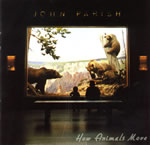|
|
 |
Dusted Reviews
Artist: John Parish Album: How Animals Move Label: Thrill Jockey Review date: Sep. 30, 2002 |

|
|
|
 |
Lions and Tigers Wear Tuxedos, Play The Blues
For two decades John Parish has remained quietly and persistently ubiquitous in a host of overlapping musical circles. His close involvement with musicians such as P.J. Harvey, Sparklehorse, The Eels, and Giant Sand by all accounts seems to transcend a straightforward credit tag. On Giant Sand's Chore of Enchantment, one of the better records of 2000, Parish's name pops up regularly in the track breakdown as recorder, mixer, and producer, but he's also the guy working the door shutter on "Way to End the Day", and that's allegedly his mocha brown suit, studded bolo tie, and State of Arizona marriage license gracing the liners. His contributions, on Chore and elsewhere, feel to be of a somewhat vague, yet indispensable quality; the magical fine-tuning, if you will.
It's only logical that Parish has been steadily collecting sounds and compositional ideas in anticipation of his own record, and it's similarly sensible that he'd enlist the help of those same musicians whose records he's touched-up to help him realize such a project. Behold How Animals Move, Parish's first proper record under his own name, not counting his soundtrack for Rosie or the Dance Hall at Louse Point project in which he shared top-billing with Harvey. It's a record with moments as pleasant and sublime as you'd expect from such a musical luminary, but it's also as uneven and patchworked as its unusual duration of composition readily betrays.
How Animals Move opens with a terse but mournful violin solo, the sort of thing that shouldn’t last longer than it does, but which lifts the curtain quite nicely. "Westward Airways", immediately following, is easily one of the album's strongest moments. On a record split pretty evenly between sparse compositions and full chamber arrangements, "Airways" is the first introduction to the latter variety. Always stately and restrained, the orchestra marches a slightly swampy bass groove into elegant crescendos led by cornet, glockenspiel, violin, and guitar. It's got the dusty weight of a finer Calexico piece with a sophisticated European brass, and the tension works well. "El Merreon", the track that follows, might function wonderfully somewhere else, but the sound of rough harmonica and a thick blanket of incidental noise feels like a jarring cut in what was previously a pretty engrossing film; something of the record's magic leaks away in the rupture. Parish makes good with some nice spaghetti western guitar on "Shrunken Man", and with breezy vocals by Does De Wolf, we're comfortably back in Convertino/Burns' rattlesnake country again.
The record peaks beautifully with its title track, again featuring the orchestra of "Western Airways". "How Animals Move" is gorgeous and soaring, and Parish fleshes it out by slightly souring the harmonies with gently bent notes. You can imagine the piece feeling too melodramatically robust if played straight, but by adding warbling accents and slightly sinister subversions of the melody, things are kept fresh. As alluring as the title of the piece (and album) is, it's confusing, because most of the record – particularly "How Animals Move" – feels far from animal. While it's nothing to prance about in a tuxedo to, practically all of the record lacks the violence or caprice of nature; its finesse is considerably more calculating and pitting it against footage from a nature documentary would seem silly.
"The Florida Recount" is heavy-handed, and while its title gives the epic quality a touch of levity, the pounding chamber arrangement abandons nuance in a head of steam. From here the album starts to feel more lackluster, with pieces like "Without Warning His Heart Stopped" and "Lord It's a Happy Land" casually swallowing up room. "Bernadette", by exception, is a fun little rocker, built around the tape splicing of a David Donahue monologue and some catchy, upbeat percussion. It's yet another song that feels abruptly out of place, but this time almost happily so, and Parish here demonstrates perhaps most competently his talent at texturing a jumble of components. "Spanish Blues" extends the ragged blues swagger, before the record dips again into stately, though far more distant, orchestral arrangements, and concludes by sweeping everything out the door with a P.J. Harvey blues romp. It flies out of left field, and whether it works for you or not, it's like ending the roller coaster with an especially jarring bump.
With How Animals Move, John Parish has gotten some music out of his system that you feel has been sitting there for some time. It's obvious that most of the songs have been meticulously worked over, and as a listener you're thankful for it, but as an album it feels like the paint has hit the canvas at random. With a more cohesive plan of attack on his follow-up, Parish is poised to deliver; How Animals Move has, at its core, a satisfying framework of promise.
By Nathan Hogan
|







